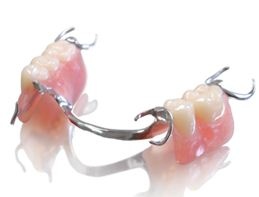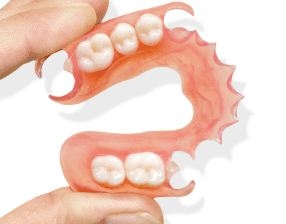A removable partial denture ( RPD ) is suitable for those who have some natural teeth remaining; it improves chewing ability and speech, and provides support for facial muscles. It will greatly enhance the facial appearance and smile.
Removable partial dentures are often a solution when several teeth are missing .
We offer two kinds of RPD:
- Cast design ; usually consist of replacement teeth attached to pink or gum-colored acrylic bases, which are connected by metal framework. Removable partial dentures attach to your natural teeth with metal clasps or devices called precision attachments. Precision attachments are generally more esthetic than metal clasps and are nearly invisible. Crowns on your natural teeth may improve the fit of a removable partial denture and they are usually required with attachments. Dentures with precision attachments generally cost more than those with metal clasps.

- Flexible design ; metal-free, lightweight flexible partial dentures that provide a natural tissue blend effect, with translucency that picks up the patient's natural tissue tone. The flexible partial material is made of a specialized form of pure nylon that will not deteriorate chemically when it comes into contact with the fluids, bacteria, and physical environment of the mouth.

Some of the advantages of this partialdesign are:
Comfortable: T he Flexibility of the material absorbs a portion of the shock of
chewing movement which reduces the stress on teeth and gum tissues
Lightweight: Metal free and can be made very thin, reducing the bulk required
for strength in acrylic base materials.
Virtually invisible: It provides a natural tissue blend effect, with translucency
that picks up the patient's natural tissue tone. This translucency is combined
with a simulation of natural blood vessels that readily adapts to a variety of
natural tissue shades
Biocompatible: Monomer-free, hypo-allergenic, stain-resistant and does not
discolor, warp or become brittle, providing maximum retention, stability and
esthetic appeal.
Durability: It provides exceptional compressive, impact and bending strength
and will not deteriorate chemically when it comes into contact with the fluids,
bacteria and physical environment of the mouth
How are dentures made?
First, an impression of your jaw is made using special materials. In addition, measurements are made to show how your jaws relate to one another and how much space is between them (bite relationship). The color or shade of your natural teeth will also be determined. The impression, bite and shade are given to the dental laboratory so a denture can be custom-made for your mouth.
The dental laboratory makes a mold or model of your jaw, places the teeth in a wax base, and carves the wax to the exact form wanted in the finished denture. You will come back for a try-in visit.
The denture is completed at the dental laboratory using the "lost wax" technique. A mold of the wax-up denture is made, the wax is removed and the remaining space is filled with pink acrylic or resin material, in dough form. The mold is then heated to harden the acrylic or resin. The denture or partial is then polished and ready for wear.
How Long Before I Get Used to My Dentures?
New dentures may feel awkward or uncomfortable for the first few weeks or even months. Eating and speaking with dentures might take a little practice. A bulky or loose feeling is not uncommon, while the muscles of your cheeks and tongue learn to hold your dentures in place.
You may experience :
- Excessive saliva flow
- A feeling that the tongue does not have adequate room
- Minor irritation or soreness is also not unusual.
If you experience constant or more sever symptoms, you should see your dentist.
Immediate Partial Denture
An immediate Partial denture is inserted immediately after the remaining teeth are removed. (Your dentist takes measurements and makes models of your jaw during a prior visit.) While immediate dentures offer the benefit of never having to be without your teeth, they must be relined several months after being inserted. The reason is that the bone supporting the teeth reshapes as it heals, causing the denture to become loose.
